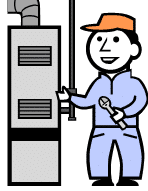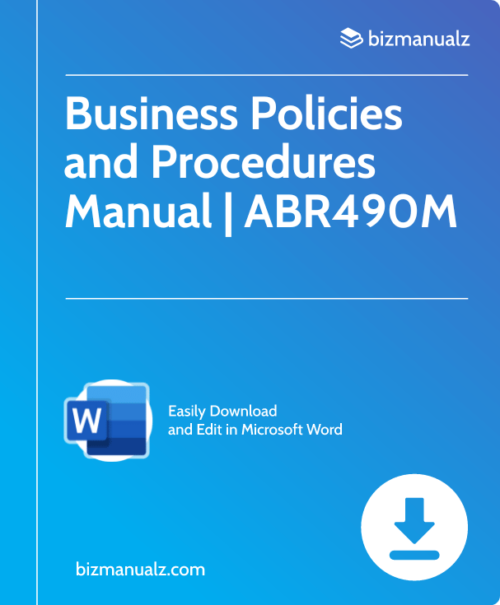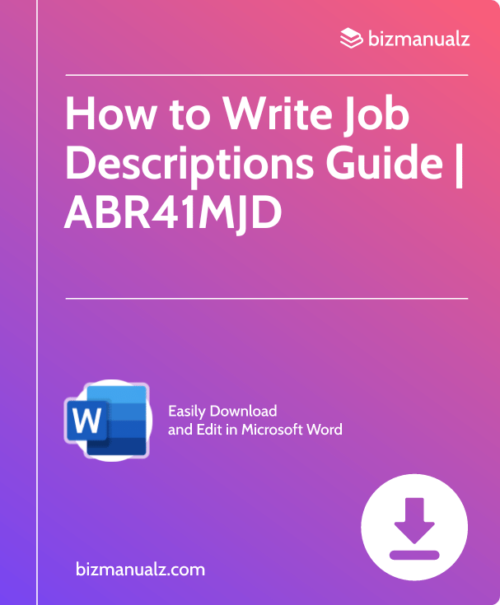Mechanic Job Description Template Word
Looking for a comprehensive and customizable mechanic job description template? Look no further than the Mechanic Job Description Template Word from Bizmanualz. This template is designed to help you create a job description that accurately reflects the duties and responsibilities of a mechanic, while also providing you with the flexibility to tailor the description to your specific needs.
The Mechanic Job Description Template Word includes sections for job summary, essential duties and responsibilities, qualifications, physical demands, and work environment. Each section is pre-populated with sample language that you can use as-is or modify to fit your organization’s needs.
With this template, you can ensure that your mechanic job description is clear, concise, and compliant with all relevant laws and regulations. You can also use the template to communicate expectations to potential candidates, helping to attract the most qualified and motivated individuals to your organization.
Whether you’re hiring for a small auto repair shop or a large industrial facility, the Mechanic Job Description Template Word is an essential tool for creating a job description that accurately reflects the skills and experience required for the position. So why wait? Download the template today and start creating your perfect mechanic job description!
 MECHANIC SUMMARY OF FUNCTIONS
MECHANIC SUMMARY OF FUNCTIONS
The Mechanic performs routine and specialized mechanical duties, including troubleshooting, repairing, and maintaining heavy equipment. They provide technical training to lower level (e.g., apprentice) personnel and sometimes manage the day-to-day operations of the repair shop in the absence of the Production Manager.
MECHANIC ESSENTIAL DUTIES AND RESPONSIBILITIES
- Perform routine operational checks and repair work in the maintenance and servicing of all machinery and equipment on the manufacturing floor.
- Inspect, repair, and adjust both electrical and hydraulic circuitry and machinery including generators, relays, engines, remote controls, heavy-duty heating and air condition systems, electric over air door systems and related equipment using electrical test equipment, circuit diagrams, schematic and blueprints.
- Adjust or replace bearings, guide rails, weights, and other mechanical parts as needed.
- Repair may require the reading and interpreting wiring, hydraulic, and pneumatics schematics, performing minor brazing and welding, and operating heavy-duty lathe.
- Follow a predetermined schedule of preventive maintenance.
- Assist higher-level personnel in more complex maintenance, repair, servicing, and troubleshooting.
- Perform other related duties incidental to the work described herein.
- Reads and understands the specifications or blueprints for the work to be done and plans the steps to be taken to complete the project.
- Uses extensive knowledge of available materials and the latest technologies to plan and select the material and tools to be used for the project.
- Remains up-to-date on information about new technology in materials, methods, techniques, and equipment.
ORGANIZATIONAL RELATIONSHIPS
Reports to the Production Manager. Works with other mechanics and machine operators.
PROCEDURES
The Mechanic Job Description is mentioned in the following procedures:
|
Procedure ID and Name |
Policies & Procedures Manual |
| AS1140 Control of Production / Service Processes | AS9100 |
| AS1150 Manufacturing | AS9100 |
| FS1120 Manufacturing | ISO 22000 |
| QP1140 Manufacturing | Quality Assurance Policy Statement and Procedures |
MECHANIC QUALIFICATIONS
A high school diploma or GED is required; vocational training is preferred. Good mechanical aptitude, dexterity, and hand-eye coordination are required.
MECHANIC PHYSICAL DEMANDS
Ability to communicate orally with management and other coworkers is important. Regular use of a variety of machines and tools is essential. Standing for extended periods is common. Hearing and vision within normal ranges is important for conversations, to receive ordinary information and to prepare or inspect documents, manuals, and drawings.
Some medium lifting is expected. Exertion of up to 50 lbs. of force occasionally is required. Good manual dexterity for the use of mechanical equipment and tools is required.
Good math and reasoning ability is essential. Able to understand and utilize engineering drawings, operating manuals, and blueprints to conduct business.
WORK ENVIRONMENT
The job is performed indoors on a manufacturing floor. Exposure to loud noises, dust, dirt, heat, sparks, oil, and smoke may occur. Protective (safety) equipment, including appropriate clothing, shoes, gloves, hardhat, earplugs, and safety goggles, is required. Activities include extended periods of standing and extensive work with measuring devices, manual and power tools, and heavy machinery.























Reviews
There are no reviews yet.